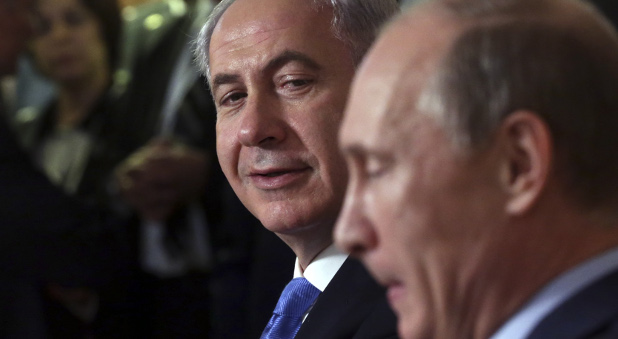Report: Syria in Possession of Russian S-300
Prime Minister Benjamin Netanyahu met with Russian President Vladimir Putin in Russia on Tuesday in an effort to dissuade him from selling advanced anti-aircraft S-300 missile batteries to Syria.
But could he be too late? According to the London-based Arab paper Al-Quds Al-Arabi, Russia has already transported the missiles to Syria, Israeli media outlet Walla reported Tuesday.
According to the report, attributed to a Syrian military official, the missile batteries are not yet operational, and are currently under full Russian supervision.
The Russian missile system is also capable of intercepting drones and cruise missiles. Its deployment in Syria would undermine Israel’s aerial superiority in the region.
Israeli officials have already asked Russia repeatedly to stop supplying Syrian President Bashar al-Assad’s regime with such “game-changing” weapons.
Despite the civil war in Syria, Russia has rejected Western demands to halt such sales, arguing that Russia has not violated international law. The Russian arms deliveries have included air defense missiles and artillery systems, but Moscow has so far held off on providing Damascus with the advanced S-300 batteries.
The powerful weapon has a range of up to 200 kilometers (125 miles) and the ability to track and strike multiple targets simultaneously with lethal efficiency. It would mean a quantum leap in Syria’s air defense capability and pose a strong challenge to any possible aerial campaign. Israel also fears that advanced Russian weapons could fall into the hands of Hezbollah, a key Syrian ally in neighboring Lebanon.
Israeli Tourism Minister Uzi Landau accused Russia on Monday of destabilizing the Middle East by selling weapons to Assad’s regime. “Anyone who provides weaponry to terror organizations is siding with terror,” Landau said.
Speaking in Warsaw on Friday, Russian Foreign Minister Sergey Lavrov said that Russia was completing the delivery of air defense systems to Syria under earlier signed contracts, but avoided specifying whether the S-300 batteries are among them.
Earlier this month, Lavrov met with U.S. Secretary of State John Kerry, and they announced they would host an international conference during which Syrian government officials and rebels would be offered the chance to name an interim government.
On Friday, Putin met with British Prime Minister David Cameron in Moscow for talks that also centered on Syria.
Cameron said the two were committed to developing a proposal for a Syrian transitional government. The British leader didn’t say if the missile issue was discussed, but Russian news agencies said Moscow had insisted it would honor all earlier signed contracts.
The business daily Kommersant, without citing a source, reported Monday that Putin told Cameron during the talks that the S-300 will be delivered to Syria. But Vyacheslav Davidenko, a spokesman for Russia’s Rosoboronexport state arms trader, refused to comment on the issue Monday.
Russia media have reported that Moscow signed a contract for the delivery of the S-300s to Syria a few years ago, but shelved it under pressure from Israel and the West.
Igor Korotchenko, a former colonel of the Russian General Staff who now heads the Center for Analysis of Global Weapons Trade, said the decision on the S-300 delivery would have to be made by Putin himself.
“It may lead to a new round of confrontation with the West,” he said. “It will have a serious impact on the balance of forces, depriving Israel of its air superiority.”
Korotchenko added that Syrian crews will have to spend up to one year in Russia training on how to use the S-300 systems. “Without that, the delivery would make no sense,” he said. “It’s a complex system, and only highly qualified crew can handle it.”
Russia has been a key ally of Assad, joining forces with China at the U.N. Security Council to shield his regime from international sanctions.
The Syrian civil war, which began as a popular uprising against Assad in March 2011, has killed tens of thousands of people and displaced several million. The two sides are deadlocked, though the regime has scored recent military gains against the rebels.
Israel carried out a number of airstrikes in recent months aimed at halting the transfer of key weapons to Hezbollah, according to foreign reports. In January, Israel destroyed a shipment of anti-aircraft missiles bound for Hezbollah, and earlier this month, it destroyed Iranian-made guided missiles also believed to be headed to Hezbollah. Israel has not officially confirmed carrying out the strikes.
For the original article, visit israelhayom.com.















































